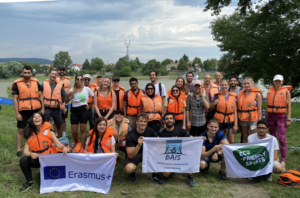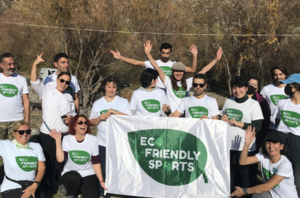
This Erasmus+ project explores the intersection of sports and environmental sustainability by promoting eco-friendly practices and raising awareness about environmental responsibility within sports communities. Implemented by international partners, the project addresses the environmental impact of sports and leverages their influence to inspire positive change. It was designed to mitigate the ecological footprint of sports activities and encourage sustainable development practices among athletes, organizations, and stakeholders.
Objectives:
- To integrate sustainability principles into sports activities and organizations.
- To raise awareness about the environmental impact of sports.
- To develop educational tools and strategies for promoting eco-friendly practices in sports.
- To foster collaboration among sports organizations, educators, and environmental groups.
Description of the Practice:
What is the practice?
The project developed educational tools and implemented initiatives aimed at reducing the environmental impact of sports activities. This included workshops, training sessions, and the creation of guidelines for sustainable sports practices.
How was it implemented?
- Research and Development: Conducted studies to identify the key environmental challenges in sports.
- Educational Tools: Created resources, such as handbooks and online guides, to teach sustainability in sports.
- Training and Workshops: Organized training sessions for coaches, athletes, and sports administrators on sustainable practices.
- Collaboration: Established partnerships with sports organizations and environmental NGOs to maximize outreach.
- Pilot Actions: Tested eco-friendly measures during sports events, such as waste management strategies, reduced energy use, and sustainable transportation options.
Impact and Results:
Quantitative Results:
- Reduction in waste produced during sports events through recycling initiatives.
- Energy savings achieved by adopting sustainable practices in sports facilities.
- Participation of hundreds of athletes, coaches, and stakeholders in training sessions.
Qualitative Results:
- Enhanced understanding of sustainability among sports practitioners.
- Positive behavioral changes, such as reduced use of single-use plastics during events.
- Stronger collaboration between sports organizations and environmental advocates.
Conclusion:
This Erasmus+ project demonstrates how sports can serve as a powerful platform for promoting sustainability. By integrating environmental responsibility into sports activities and education, the project inspires athletes and organizations to adopt eco-friendly practices, creating a lasting impact on both communities and the environment.
Recommendations:
- For Sports Organizations: Implement sustainability measures in event planning, facility management, and athlete training.
- For Policymakers: Support initiatives that promote environmental responsibility in sports through funding and policy frameworks.
- Next Steps:
- Expand the project to additional sports disciplines and regions.
- Develop advanced educational tools and online resources to reach a broader audience.
- Collaborate with more stakeholders to create a global network of sustainable sports practices.

 .
.
